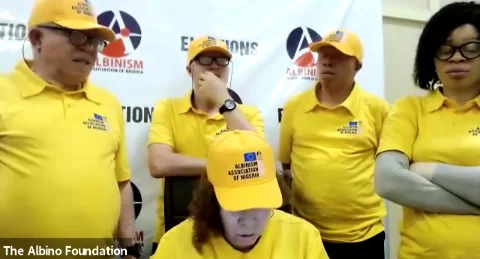
NIGERIAN ALBINISM ASSOCIATION RAISES ALARM OVER RISING SKIN CANCER DEATHS
As the world marked the 2025 World Cancer Day yesterday, the Albinism Association of Nigeria (AAN) has raised concerns over an escalating health crisis facing Persons With Albinism (PWAs) across the country.
The association revealed that three members of the community have died from skin cancer in the past few days alone, while many others continue to suffer without access to treatment.
According to a press release signed by the National President of AAN, Bisi Bamishe on Tuesday, the plight of PWAs remains largely unaddressed, despite continuous advocacy efforts for government intervention.
Ms Bamishe noted that some of the affected members are “lying helpless in hospitals, while others struggle in their homes without access to proper medical care or hope for survival.”
She said: “Today, as the world observes World Cancer Day 2025 under the theme “United by Unique,” we seize this moment to amplify the voices of PWAs in Nigeria.
“The theme speaks to the power of unity in addressing the global cancer burden, and now more than ever, we call on the federal, state, and local governments, the legislative arms at all levels, well-meaning individuals, local and international donors, and relevant stakeholders to stand with us in the fight against this disease.”
Ms Bamishe explained that for years, PWAs in Nigeria have faced significant health challenges.
She said the absence of structured government interventions, including access to free or subsidised skin cancer treatments, preventive measures such as sunscreen distribution, and specialised dermatological care, have left the albinism community in a state of despair.
“Without immediate action, we will continue to witness the preventable deaths of our members,” she said.
To tackle this crisis, she said the association had undertaken numerous advocacy initiatives, engaging with key stakeholders, including policymakers, health authorities, and legislators, to raise awareness about the critical health concerns affecting persons with albinism.
She also urged the government to implement sustainable policies that will ensure access to affordable healthcare, routine skin cancer screening, and the provision of life-saving treatments for affected persons.
“However, the time for mere discussions has passed. We need tangible, swift, and decisive actions to save lives,” Ms Bamishe said.
To address the alarming rate of skin cancer among PWAs, the association urged the government, healthcare providers, and stakeholders to take immediate action.
Ms Bamishe called for inclusive healthcare policies that provide free and subsidised skin cancer treatment, early screening, and regular dermatological check-ups for PWAs in public hospitals.
She said this should include the integration of skin cancer into the scheme of the National Health Insurance Authority (NHIA), ensuring that PWAs have access to affordable healthcare.
AAN also called on the government and corporate organisations to make sunscreen, wide-brimmed hats, and protective clothing accessible and affordable, especially to low-income PWAs, through targeted intervention programmes and corporate social responsibility initiatives.
World Cancer Day is an international day marked on 4 February to raise awareness on cancer and to encourage its prevention, detection, and treatment.
The day is led by the Union for International Cancer Control (UICC) to support the goals of the World Cancer Declaration, written in 2008.
Cancer, a leading cause of death worldwide, affects millions of people, with approximately 19.3 million new cases and 10 million cancer-related deaths reported globally in 2020.
Skin cancer, one of the most common types of cancer, accounts for approximately one in five new cancer cases.
In Nigeria, skin cancer poses a significant threat to PWAs, who are at increased risk due to their genetic predisposition.
According to WHO, the 2025 theme highlights the importance of people-centred cancer care that fully integrates each individual’s unique needs, with compassion and empathy, leading to the best health outcomes.
 Premium News
Premium News